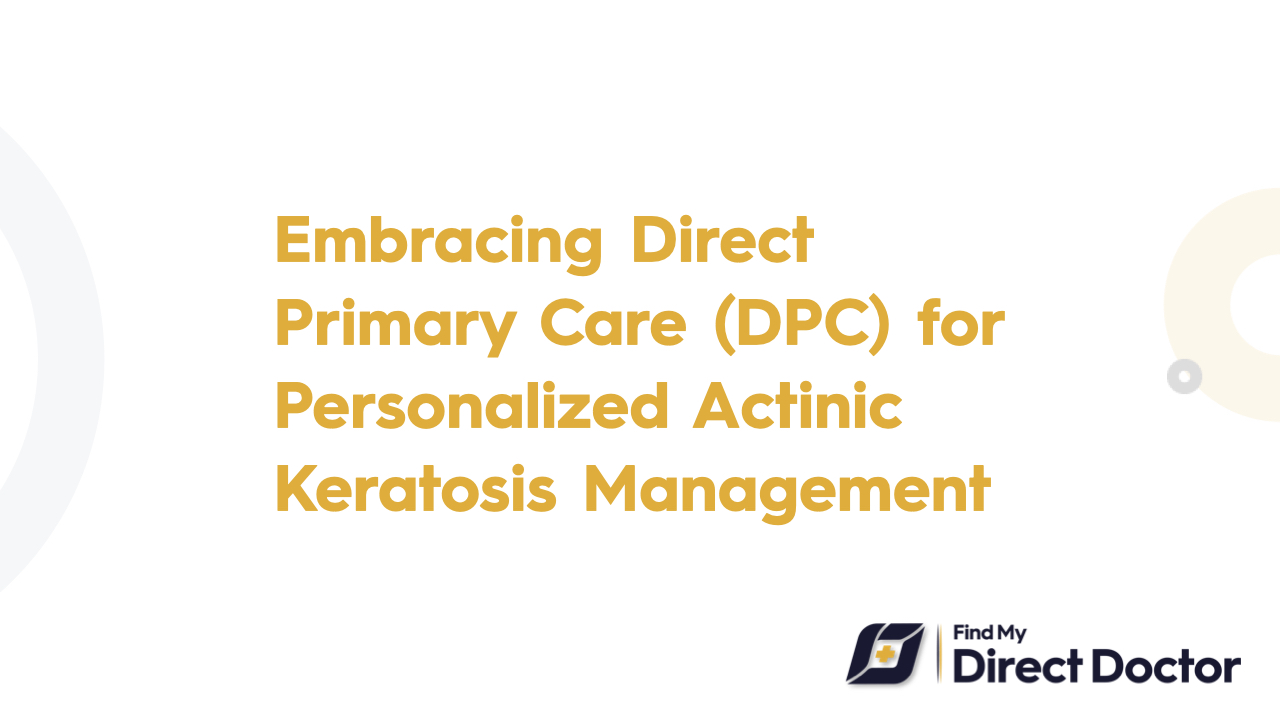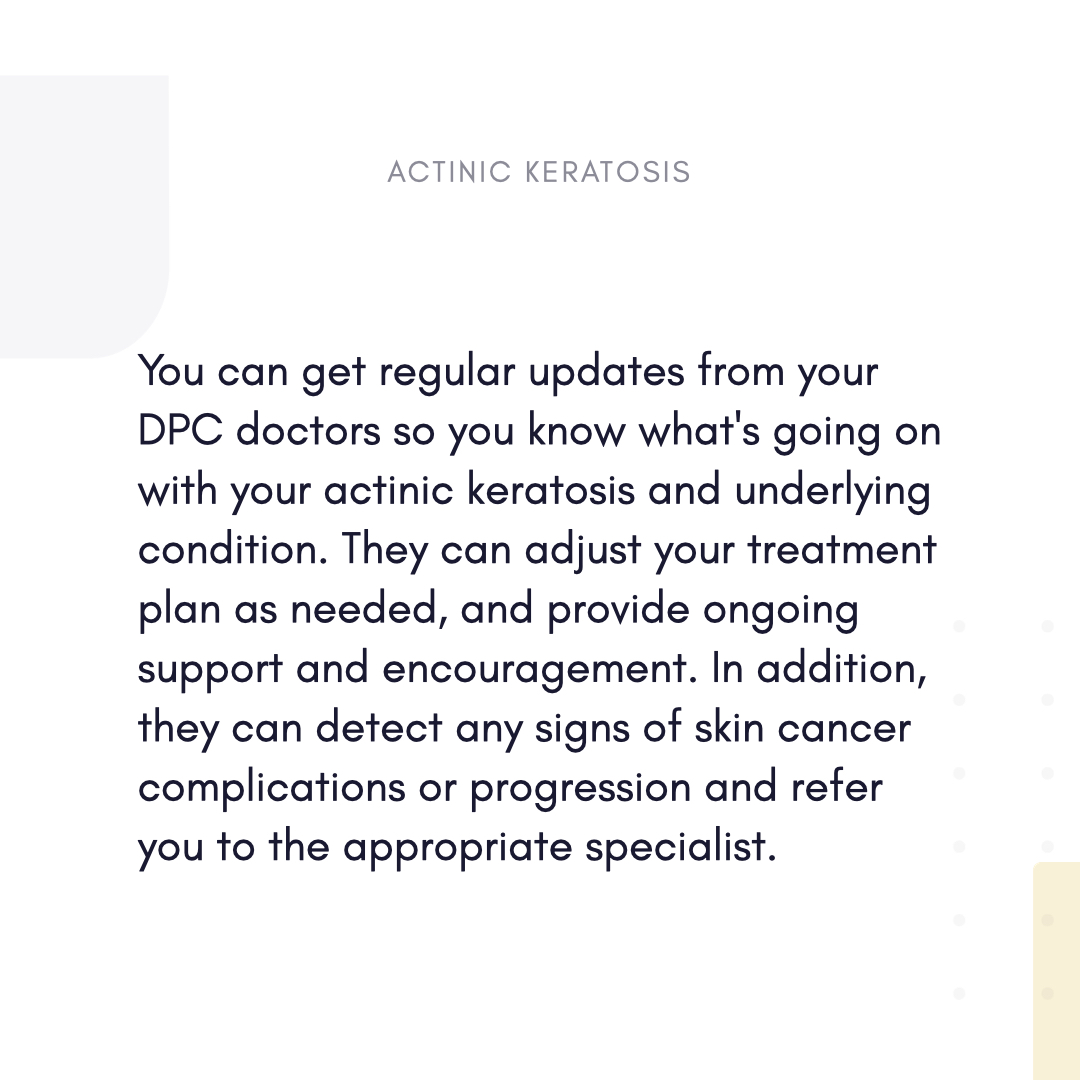Actinic Keratosis and Direct Primary Care (DPC): Personalized, Proactive Skin Protection
One warning sign your skin should not overlook is actinic keratosis (AK)—those rough, scaly lesions resulting from years of sun damage. Early detection and treatment are especially important since left untreated AKs can develop into squamous cell carcinoma. Combining accessibility, cost, and individualized treatment to protect your skin, Direct Primary Care (DPC) presents a patient-centered method of AK treatment. Here's how DPC lowers cancer risk and streamlines AK management.

Knowing Actinic Keratosis: A Precancerous Problem
Usually found on sun-exposed sites like the face, scalp, ears, and hands, AKs are dry, crusty lesions. Key risk factors include:
-
Sun exposure: History of sunburns, outdoor occupations.
-
Fair skin: Less melanin for UV protection.
-
Age: Most common in individuals over 40.
-
Weakened immunity: Organ transplant recipients or immunocompromised patients.
-
Why early action matters:
- ~10% of AKs progress to squamous cell carcinoma.
- Multiple AKs significantly increase cancer risk.
How DPC Improves AK Attention to Detail
Under the membership model known as Direct Primary Care (DPC), patients pay a monthly fee—usually between USD 50 and USD 150—for unlimited access to their primary care physician. For AK patients, this means:
- No waiting for assessments of new or evolving lesions.
- Transparent pricing for treatments and follow-ups.
- Seamless care from diagnosis to resolution.
-
Early Education and Detection
DPC prioritizes prevention through:
- Full-body skin exams to identify AKs, moles, or suspicious growths.
- Dermoscopy (magnified imaging) to differentiate AKs from benign lesions.
- Sun safety education: Personalized SPF, protective gear, and UV avoidance guidance.
-
Customized Treatment Approach
Using American Academy of Dermatology (AAD) guidelines, DPC creates plans based on lesion severity and patient preferences:
- Lesion-directed therapies:
- In-office cryotherapy (USD 50–100 per session).
- Topical treatments (5-fluorouracil, imiquimod, diclofenac gel).
- Field-directed therapies:
- Cash-pay referrals for photodynamic therapy (PDT) for widespread AKs.
- Prevent subclinical sun damage to halt new lesions.
-
Constant Monitoring and Prevention
- Biannual skin checks for high-risk patients (e.g., immunocompromised).
- Affordable follow-ups included in most memberships for long-term vigilance.
DPC Benefits for AK Patients: Accessibility and Convenience
- Same-day evaluations for new lesions to reduce progression risks.
- Direct communication via text/email for urgent concerns.
- Patient-driven treatment:
- Time to discuss options (e.g., cryotherapy vs. topical creams).
- Focus on cosmetic outcomes for visible areas like the face.
- Cost transparency:
- Cryotherapy at USD 50–100/session (vs. USD 200+ elsewhere).
- Medications like 5-fluorouracil at wholesale rates (~USD 30/tube vs. USD 100+ retail).
Customized AK Management in DPC
The AAD emphasizes patient-tailored strategies. DPC delivers:
- Few lesions:
- Cryotherapy for quick, minimal-scar treatment.
- Topical retinoids to improve texture and reduce recurrence.
- Widespread sun damage:
- Combination therapy (cryotherapy + imiquimod) for stubborn AKs.
- Preventive field therapy: Vitamin C serums and daily sunscreen.
- High-risk patients:
- Affordable biopsy referrals for ambiguous lesions.
- Immune support for conditions like diabetes that impair healing.
Personal Success Stories from Real Life
- Case 1: Linda, 62, had scalp AKs treated with cryotherapy and topical 5-fluorouracil. Biannual DPC checks have kept her AK-free for 3 years.
- Case 2: Mark, 55, avoided a USD 600 dermatology bill when his DPC doctor confirmed a benign forearm lesion in-office.
FAQs: Actinic Keratosis and DPC
- Q: Can DPC manage advanced AK cases?
- A: Yes! DPC coordinates referrals for PDT/surgery while controlling costs.
- Q: Do topical treatments require frequent visits?
- A: No—remote tracking via photo updates reduces in-person visits.
- Q: Does insurance cover AK care?
- A: DPC offers self-pay discounts, bypassing insurance markups.
Why DPC Changes the Rules for AK Management
The AAD stresses early AK treatment and education. DPC enhances this by:
- Strengthening patient-provider bonds: Time for collaborative decisions.
- Reducing specialist referrals: Most AK cases handled in-house, saving time/money.
- Prioritizing prevention: Sun protection education to prevent new lesions.
Save Your Skin Now with DPC
Actinic keratosis is a warning for your skin and overall health. DPC provides a partner dedicated to affordable, personalized care—prioritizing prevention and peace of mind.






